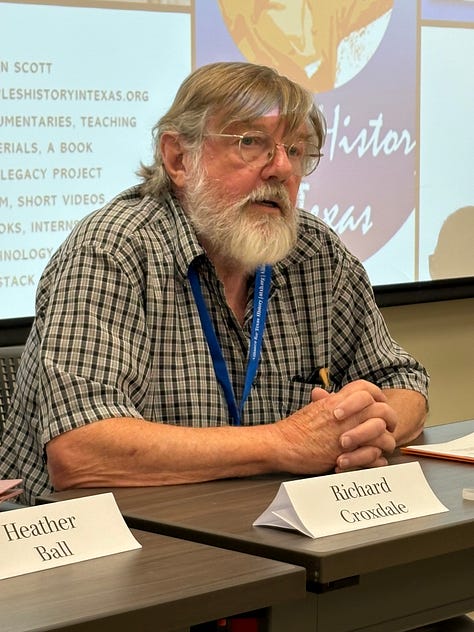Peoples History in Texas, in the fall of 2025, will celebrate 50 years of producing stories about Texas history. As we often mention, PHIT emphasizes stories that have been forgotten but should be remembered, but primarily stories about positive change.
The Alliance for Texas History had its first convention on May 15 to 17. PHIT organized and presented a panel on Friday, the 16th on Mining the Archives: Fifty Years of Oral History.
Melissa Hield, long time executive director of PHIT, moderated the panel. Richard Croxdale offered a summary/oral history of PHIT projects over those 50 years. Heather Ball explained the Hightower Legacy, which is PHIT’s current ongoing historical oral history. Adjunct PHIT researcher, Alice Embree, talked about projects on the RAG and the Austin Law Commune and emphasized the need to use these archives for research.



It was well received. Thank you very much, ATxH, for the opportunity to present our half century of work.
Papers from all the panels summarizing the talks are being sent to the organizer. They will be available as pdfs at some point.
Here is the pdf of Richard Croxdale’s history of PHIT. It is 8 pages long so is being made available as a pdf. It is broken into four sections. Film documentaries, public access TV, WWW and the internet, and social media.
The papers of Heather Ball and Alice Embree will be made available in subsequent posts.
The point of Croxdale’s history is that the technology and formats of documentaries change over the years. The structure of public history has to change with the times. PHIT, however, has the original interviews of everything that we have collected, and the oral histories have been digitized so theoretically they can be presented in the current social media format of short videos and podcasts. PHIT currently has a TikTok channel and a Podcast channel which are underutilized.
PHIT is currently trying develop more short form social media historical presentations. If you like our work, think about becoming a paid subscriber so that we can further develop this new approach to presenting Texas history in a non-academic setting.




